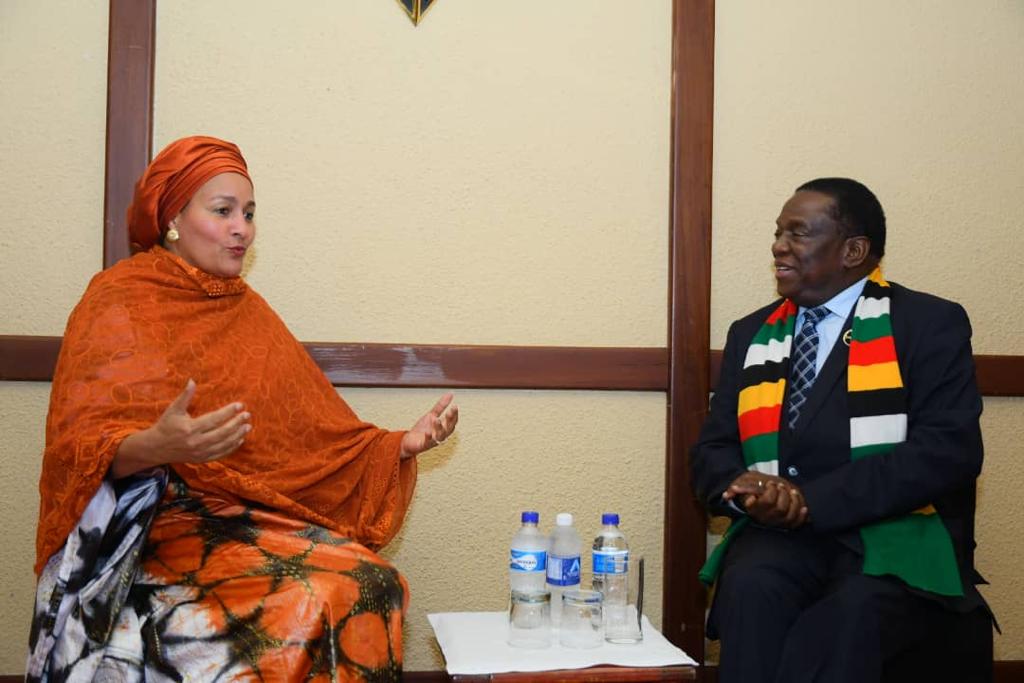Noting that Africa has made considerable progress in education, health and other social outcomes, Amina J. Mohammed, the United Nations (UN) Deputy Secretary-General has said the pace of poverty reduction is slow on the continent while inclusive growth still remains elusive.
Mohammed made the remarks during a Special Session of the Regional Coordination Mechanism for Africa at the ongoing Sixth African Regional Forum on Sustainable Development in Victoria Falls yesterday.
“The region also has the highest prevalence of hunger, with the rate increasing from 18.3 per cent in 2015 to 19.9 per cent in 2018. This means that almost 40 million Africans – especially women and children – went hungry under this period. This is exacerbated by the impact of climate change on the continent with nearly 22.8 million people now severely food insecure in Ethiopia, Kenya, Somalia, South Sudan, Sudan and Uganda,” Mohamed said.
The UN Senior Official said major gaps also exist in the area of employment – decent jobs, and gender equality, putting at risks the continent’s efforts to leverage the democratic dividend.
The Secretary-General issued a global call for a Decade of Action to deliver the SDGs last September. The Decade of Action is an opportunity to unleash a new wave of implementation efforts that will deliver for the people and planet.
Based on extensive consultations, the UN identified three fronts to advance its work.
The first is mobilisation. The SDG transformation will not happen unless people across the world are aware of the goals, see their own concerns reflected in the Goals, and know what they can do to implement the Goals. As a result, the UN had a dialogue with the youth where young people shared their thoughts and recommendations on how to step up the pace and scale of implementation.
“The second front for the Decade is raising ambition. No government across the world can claim to be on track to meet the Goals by 2030; therefore, every government – and indeed every stakeholder – must aim higher. We must support governments to ensure their broader national development plans and financing frameworks correspond to the magnitude of the change needed to deliver by 2030. We need to strengthen transparency, data and accountability efforts and use several important international meetings this year on gender equality, biodiversity, the oceans and sustainable transport to demonstrate renewed and strengthened commitment to our Goals.
“A third front for the Decade of Action is to supercharge ideas to solutions – drawing on the capacities of different stakeholders and effective international cooperation. Since 2015, we have seen a wave of initiatives to support the SDGs. But too few of these have delivered concrete results at the scale and with the urgency that countries and communities need. We know that certain policy changes or specific breakthroughs around key opportunities can catalyse progress on several SDGs simultaneously, at speed and at scale.”
Speaking during the same session, Kwesi Quartey, the Deputy Chairperson of the African Union Commission said Education, Science and Technology, Health and Employment remain the basis for Sustainable Development, and remain indispensable ingredients to ensure Peace, Security and Sustainable Development in Africa.
Quartey said as indicated in the rationale for AU theme for this year, the most vulnerable groups including women and children bear the brunt of the ill effects of armed conflicts.
“Women and girls suffer disproportionately from gender-based violence and other abuses and violations of their human rights, both during and after armed conflicts. Conflicts are one of the biggest challenges for the implementation of Agenda 2063 in Africa. This is what makes our current theme for this meeting, the African Union theme of the year “Silencing the Guns: Creating Conducive Conditions for Africa’s Development” aiming at ending all wars, civil conflicts, gender-based violence, violent conflicts and preventing genocide in the continent by 2020, so apposite.
“H.E Moussa Faki Mahamat, Chairperson of the Africa Union Commission during the last HoSG Summit, reiterated that Africa requires the participation of all and most importantly Women if we are to achieve peace and development on the continent, and thereby declared 2020-2030 as the decade for Women Financial Inclusion in Africa. In May last year in Ouagadougou, Burkina Faso, a historic consultative meeting that aimed at enhancing women leadership in peace processes and advancing the implementation of the Women, Peace and Security (WPS) Agenda, to meaningfully contribute to silencing the guns in the continent for sustainable peace and development was very conclusive,” he added.






